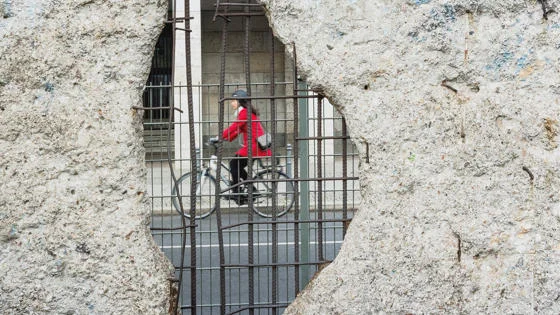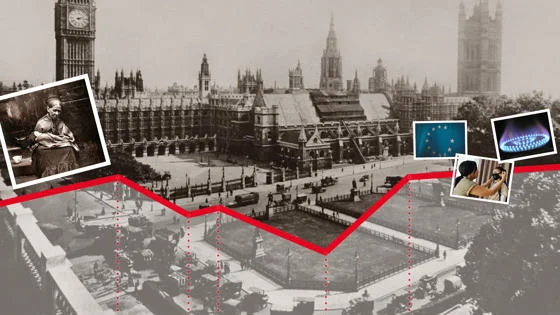How did soldiers cope with the horrors of the Great War?

Contents
Anthem for a Doomed Youth, Futility, and An Irish Airman Foresees his Death. The titles of these First World War poems alone tell a tale of despair and hopelessness. Yet despite the brutality of the Great War, soldiers were able to endure a drawn-out conflict. How did they survive the horrors of 1914-1918 and what lessons can we learn from the way they sought to make sense of the greatest crisis of their time?
Dr Alex Mayhew, Assistant Professor in the Department of International History at LSE, explores the issue of morale on the Western Front in his new book Making Sense of the Great War. While the book focuses on English infantrymen during the conflict, it also tells a more general story of how humans cope with, and respond to, extraordinary events.
"First World War literature paints a very specific picture of what the war was like and how it was experienced. But that picture is mostly a product of the post-war world, as people tried to make sense of their experiences in the conflict’s aftermath. It is clear that nobody could have endured the kind of traumas they experienced during military service if they had actually perceived them to be as futile as a lot of the poetry and novels imply," he explains.
"I was particularly interested in this issue of morale and the variety of ways in which individuals made sense of the world around them at times of great crisis, as well as how soldiers’ social groups, and the environment they inhabited, interacted with individuals' psychologies."
Crisis can be experienced as two things … [both of which] require very different responses and coping mechanisms.
What is a crisis?
To answer these questions, Dr Mayhew studied the diaries and letters of English soldiers – primarily infantrymen serving in front line units – looking particularly at their writings during three moments in the war when the morale of the British Army is known to have been particularly fraught. "Historians today tend to frame these as crisis moments. However, the soldiers themselves very rarely articulated their experiences in the way that one might expect, given what we know of their circumstances," he says.
"Before this research, I had always assumed that crisis was an event – a thing that you encountered. But as I started my research, it became clear that crisis can be experienced as two things: a crisis can be acute (a moment that we must respond to), but crises can also be chronic (situations or experiences which we can't do anything to change, at least in the short term). These two forms of crisis require very different responses and coping mechanisms, so what I became primarily interested in is: what does it mean to experience a crisis, and how do people get through these times?"
Navigating an acute crisis requires having the skills, knowledge or necessary instincts to be able to respond in the most effective manner. Here, strong training will have been vital to helping soldiers cope with the harrowing experiences of battle. Dr Mayhew explains: "Take, for example, being attacked by gas shells. In this case the military has to have imbued its soldiers with the knowledge and skills – knowing how to put on a gas mask without panicking – that will allow them to respond in an adequate and effective manner."
Coping with a chronic, longer-term crisis – such as living through the most catastrophic war to date – however, requires a different type of response, one less dependent on input from an external source like the army and more reliant on an individual’s "ability to create agency within those experiences and adopt mechanisms that will both develop and maintain high morale and also try to make sense of their experiences."
Dr Mayhew continues: "The way soldiers responded to being at the Front tells us a lot about human adaptability and our ability to build resilience by accepting the world around us and normalising whatever it is we’re experiencing."
The way soldiers responded to being at the Front tells us a lot about human adaptability and our ability to build resilience.
Finding meaning in the trenches: coping mechanisms and the value of hope
For those soldiers, adapting to the long-term horrors of war meant crafting narratives that gave purpose and meaning to their experiences. Instead of soldiers focusing on the discomfort and pain of their daily life, Dr Mayhew identifies several psychological methods that helped soldiers get through each day.
"I look at soldiers’ processes of familiarisation and normalisation and how, despite the Western Front being an alien and often traumatic physical experience, they also see it as a kind of canvas for their lives," he explains. "They normalise even the most destructive features of it and imbue it with a lot of meaning and familiarity. I argue that this acclimatisation is crucial in helping them cope."
Hope is also of supreme importance to morale, Dr Mayhew finds. "Hope is really the central point that morale and endurance pivot around. It was essential that soldiers were able to conceive of a productive future that they were working towards. This underpinned their ability (and willingness) to endure the most horrific of things," he says.
Hope is a complex cognitive function, boosting morale not just at times of victory, but also during times of great threat, says Dr Mayhew. He points to events of March 1918, which saw the Germans taking the offensive following a period on the defensive in Belgium and France: "There’s suddenly a chance that the Allies might lose the war, and this seems to re-engage the English troops. They don’t want that, and this creates new impetus.
"Seeing the Germans successfully breaching the Allied lines paradoxically gives them renewed hope that their turn will also come. So in this way we can see even a negative experience can become something that instils faith and creates hope in change."
Even a negative experience can become something that instils faith and creates hope in change.
Patriotism, obligation and duty
The book also explores the role patriotism and duty played in bolstering soldiers’ morale and what the idea of fighting for one’s homeland really meant to those on the Front. "I find that every soldier is fighting for a very specific vision of England, or Britain," says Dr Mayhew. "For some, that might be the streets around their house or the landscapes around their village. For officers, it was sometimes more broad-ranging, with a sense of fighting for British institutions or notions of Empire."
This can be explained, in part, by the way the army interacted with those of different ranks. "At this time, officers are still assumed to be from the upper echelons of British society. They get a King’s Commission imbued with all of these almost timeless ideas of infinite duty and honour, and they genuinely feel this responsibility, not just to the monarchy, or the nation, but to their men," he explains.
Those lower down the ranks did not have such a connection to state and country, partly, Dr Mayhew argues, because of the way the army defined their duties. Their relationship with the military was more clinical, setting out codes of conduct and the requirement to give back all their kit and army possessions when they finished. As a result, these infantrymen were more likely to view their wartime service as something finite – a duty that would end once one had "done one’s bit".
Despite this, this concept of fighting for their homeland resonated across all ranks and was key to maintaining morale. "Everyone had a very personalised sense of what home was, but the thing I find that underpins their experiences is that they all believe they're defending their homeland, and that concept was very resilient to change," Dr Mayhew says.
What soldiers of the Great War can teach us
While understanding how societies navigated challenges in the past can help us think about how to respond to and overcome future crises, Dr Mayhew’s findings also provide suggestions as to why, as a species, we are often better at adapting to crises than creating the change needed to avoid them.
"The classic statement is the past is a foreign land. But at its heart, history is about how people, institutions, the state and global society respond to crises. However society has changed, there are still commonalities (across both time and space) in the way that individuals and communities have navigated crises. Some suggest crisis is a product of modernity, but one could argue it has always accompanied the human story," he concludes.
"It's both hopeful and terrifying to consider just how adaptable humans are to the world around them and how easy it is for us to normalise crisis. I think that helps explain why humans have been so successful, and why we, to this day, still migrate across oceans (and endure great dangers and traumas) to try and create a better future for ourselves. But it also points to why it's so difficult for us to respond to things like climate change, because we are so good at adapting and so relentlessly hopeful – even when that hope might be misplaced. And while that is hugely helpful in getting us through disasters, it maybe isn't so helpful when we need to engineer change in the face of the environmental crisis."
Dr Alex Mayhew was speaking to Jess Winterstein, Deputy Head of Media Relations at LSE.
Download a PDF version of this article




